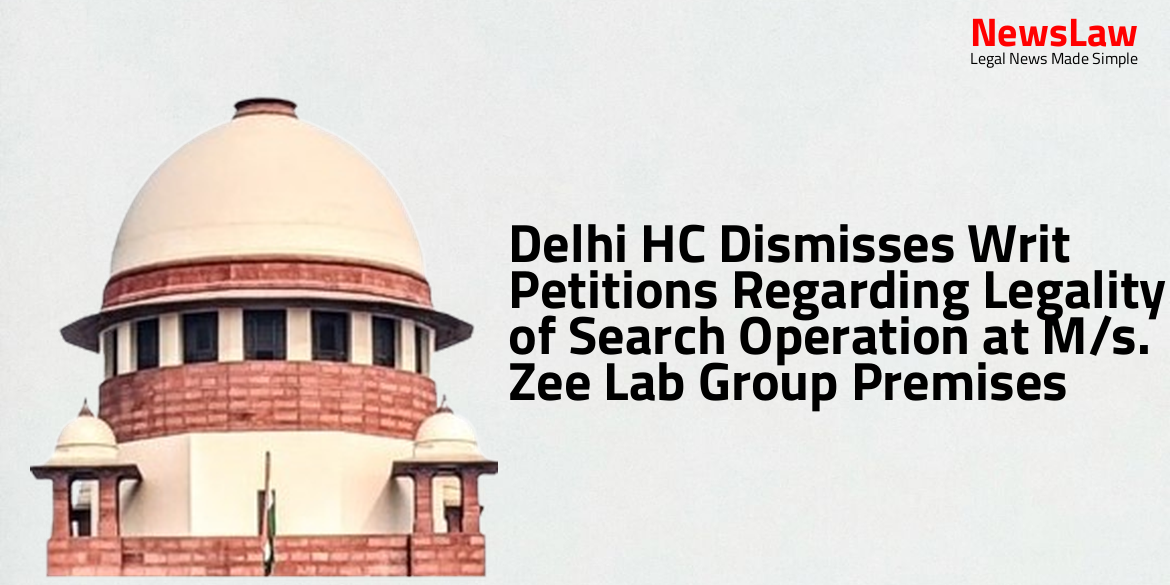The High Court’s recent decision on the maintainability of a writ petition under Article 227 against the National Commission’s order delves into crucial legal analysis. Examining key provisions of the Consumer Protection Act and the Constitution, the Court provides clarity on the scope of judicial oversight and remedies available in such cases. The focus is on ensuring adherence to legal parameters and upholding the principles of justice within the judicial framework.
Facts
- The High Court of Delhi passed an interim order staying the National Consumer Disputes Redressal Commission’s order dated 9.12.2021.
- The respondent challenged the National Commission’s judgment in a writ petition under Article 227 of the Constitution of India.
- The original respondent has appealed against the High Court’s interim order.
- The High Court, in a detailed order dated 31.03.2022, affirmed that a writ petition under Article 227 is maintainable against the National Commission’s order dated 9.12.2021.
- The appellant filed a consumer complaint before the Delhi State Consumer Redressal Forum on 10.08.2013 for non-handover of possession despite payment.
- The State Commission allowed the complaint and directed the respondent to hand over possession, subject to meeting requirements.
- The National Commission confirmed the State Commission’s order and directed the builder to deposit the cost of the apartment and compensation.
- The High Court stayed the National Commission’s order, subject to the builder depositing 50% of the compensation within four weeks.
- The appellant filed an execution and contempt petition before the State Commission for non-implementation of the judgment.
- The High Court passed interim orders regarding the jurisdiction under Article 227 of the Constitution of India against the National Commission’s orders.
- The High Court stayed the National Commission’s final order and the matter is pending further hearing before the High Court.
Also Read: Ruling on Circumstantial Evidence in Murder Case
Issue
- The main issue posed for consideration is whether a writ petition under Article 227 of the Constitution of India is maintainable against an order passed by the National Commission in an appeal under Section 58(1)(a)(iii) of the 2019 Act.
- The relevant provisions of the 2019 Act, specifically Sections 58 and 67, are key for determining the maintainability of such a writ petition.
- Section 58 of the 2019 Act deals with the jurisdiction of the National Commission, with specific emphasis on appeals.
- Section 67 of the 2019 Act may also be relevant for understanding the context of the issue at hand.
Also Read: Challenging Legal Presumptions in Negotiable Instrument Cases
Arguments
- Shri Karanjot Singh Mainee argues that appeal under Section 67 of the 2019 Act is not available against the order of the National Commission under Section 58(1)(a)(iii)
- Maintains that appeal under Section 27A(1)(c) of the Consumer Protection Act, 1986 is the appropriate remedy against the National Commission’s order
- Contends that High Court should not have entertained the writ petition under Article 227 without exhausting the remedy under the Consumer Protection Act, 1986
- Alternatively suggests that even if the High Court could entertain a writ petition under Article 227, it should not have stayed the National Commission’s order in First Appeal No 250/2021
- A writ petition under Article 227 of the Constitution of India is maintainable
- The decision in Associated Cement Companies Limited v. P.N. Sharma, AIR 1965 SC 1595 and L. Chandra Kumar v. Union of India, (1997) 3 SCC 261 support this submission
- The High Court correctly held that a writ petition under Article 227 is maintainable against the judgment and order passed by the National Commission
Also Read: Legal Analysis Critique in High Court’s Quashing Order
Analysis
- The National Commission has jurisdiction over complaints where the value of goods or services paid exceeds rupees ten crore.
- It can entertain complaints against unfair contracts exceeding ten crore rupees.
- It has the authority to hear appeals against the orders of State Commissions and the Central Authority.
- The National Commission can call for records and pass appropriate orders in consumer disputes pending before State Commissions if there are jurisdictional issues or irregularities.
- The jurisdiction, powers, and authority of the National Commission can be exercised by Benches constituted by the President.
- In case of differing opinions within a Bench, the majority opinion prevails, and in case of a tie, the matter is referred to the President for resolution.
- An appeal against the order of the National Commission can be made to the Supreme Court within thirty days, or after the expiry of thirty days with sufficient cause shown.
- No appeal can be entertained by the Supreme Court if the appellant has not deposited fifty percent of the required amount as per the National Commission’s order.
- The High Court has the jurisdiction under Article 227 and 136 of the Constitution of India to entertain appeals against orders made by the National Commission.
- The High Court must adhere to the parameters set under Article 227 when exercising its jurisdiction.
- Remedies available under Article 227 are considered more accessible and lower in cost compared to remedies under Article 136 of the Constitution.
- Bodies deriving adjudicatory powers from agreements or specific statutes may not qualify as tribunals under Article 136.
- Access to justice is facilitated by the High Court through Article 227, especially in cases where constitutional questions are involved.
- The National Commission, through statutory powers, acts as a tribunal to conclusively determine disputing parties’ rights.
- Use of judicial powers by an authority suggests a tribunal-like role and makes it subject to High Court jurisdiction under Article 227.
- The establishment of separate courts by Parliament was challenged, but authorities determining rights between parties are considered within the realm of tribunals.
- A balance between judicial review powers of High Courts under Articles 226/227 and adjudication in Tribunals is essential.
- The exclusion of High Courts’ jurisdiction in judicial review matters is not absolute, according to the analysis.
- Restricting Tribunals to non-constitutional issues would cause delays and splitting of proceedings.
- Aggrieved party can approach the concerned High Court under Article 227 of the Constitution against the order passed by the tribunal.
- Scope and ambit of jurisdiction of Article 227 of the Constitution explained in various cases including State of Karnataka vs Vishwabarathi House Building Co-operative Society and Ors.
- High Court must act within the parameters of Article 227 while exercising powers under it.
- Grant of interim stay/relief in a writ petition under Article 227 must be done keeping in mind the limited jurisdiction of superintendence.
- Any interim stay/relief granted in a writ petition under Article 227 against an order of the National Commission is subject to the powers under Article 227 of the Constitution.
- Approaching the High Court under Article 227 or the Supreme Court against an order of a Commission under the Act is considered an adequate safeguard.
- The High Court will consider the observations made previously when deciding on interim relief/stay.
- A writ petition under Article 227 of the Constitution of India against the order of the National Commission is maintainable.
- The High Court’s view on this matter is supported and agreed upon.
Decision
- The present appeal is dismissed.
- No order as to costs in the case.
Case Title: IBRAT FAIZAN Vs. OMAXE BUILDHOME PVT. LTD. (2022 INSC 573)
Case Number: C.A. No.-003072-003072 / 2022



